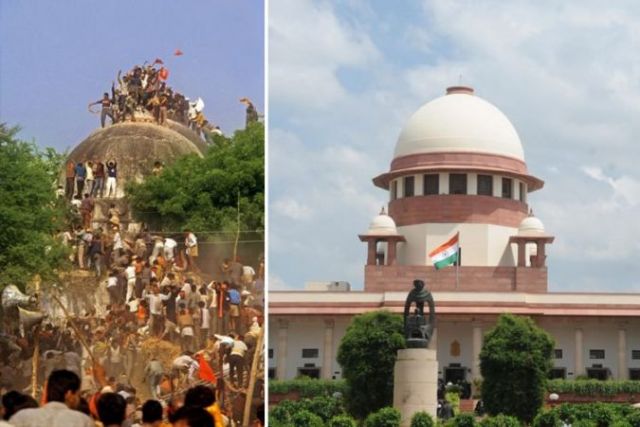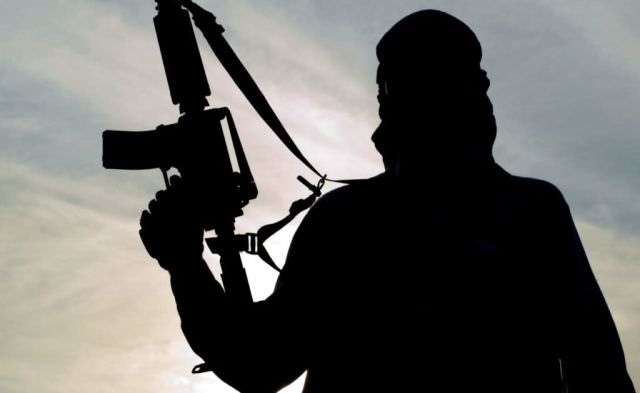
by admin | May 25, 2021 | News, Politics
 New Delhi : The Supreme Court on Friday was told that just as the statue of Bamiyan Buddha was destroyed by the Afghan Taliban, similarly the Hindu Taliban razed the Babri Masjid in Ayodhya on December 6, 1992.
New Delhi : The Supreme Court on Friday was told that just as the statue of Bamiyan Buddha was destroyed by the Afghan Taliban, similarly the Hindu Taliban razed the Babri Masjid in Ayodhya on December 6, 1992.
“Just as Bamiyan Buddha was destroyed by Afghan Taliban, same way Babri Masjid was destroyed by Hindu Taliban,” the bench of Chief Justice Dipak Misra, Justice Ashok Bhushan and Justice S. Abdul Nazeer was told by senior counsel Rajeev Dhavan.
“No faith has a right to destroy a mosque,” Dhavan said, assailing the argument by the Hindu side that no equity survived once the mosque had gone (razed).
“It can’t be, should not be argued that no equity lies and there is nothing left to be decided once it (mosque) has been destroyed,” Dhavan told the bench.
Dhavan said this to the three-judge bench while advancing arguments that the 1994 top court judgment that had said that offering namaz in a mosque was not an essential practice of Islam needed to be revisited.
“The question of essential practice was totally alien to the case before the top court bench in 1994,” he said.
Appearing for the lead petitioner M. Siddiqui represented by his legal heir, Dhavan assailed the Uttar Pradesh government for abandoning its neutrality and pointing fingers at Muslim litigants for making “belated efforts” seeking a relook at the 1994 Ismail Farooqui judgment that had said that mosques were not an integral part of religious practice of offering prayers.
He told the court that the neutrality had been broken by the Uttar Pradesh government which was represented by the Additional Solicitor General – a law officer of the Central government which is the receiver of the disputed land.
Describing the shift in the stand of the Uttar Pradesh government as a “breach of faith”, Dhavan said that there was no delay on the part of the Muslim litigants in flagging the issue and they did it in the first instance when the opportunity arose.
It were the Hindu litigants who had relied upon the 1994 judgment during the hearing of the title suit of the disputed site before the Lucknow bench of Allahabad High Court.
The senior counsel took exception to senior counsel K. Parasaran telling the court on May 17 that for Muslims “Makkah and Madinah alone are places of particular significance” as pilgrimage centres but such was not the case with Ayodhya/Babri Masjid.
Describing it as invidious argument, Dhavan said this meant that for the Muslims and Christians, their centre of pilgrimages were overseas and thousands of churches and mosques could be closed.
This also amounted to saying that Hindus were protected by the Article 25 of the constitution but not the Muslims and Christians and “We (the Hindus) are superior and everything belongs to us”.
Dhavan described as an indulgent act of “charity” the offer by the Shia Waqf Board to move out of the disputed site in return for a site for a new mosque.
He said the 1994 judgment needed to be revisited as the Lucknow bench of Allahabad High Court relied on this in deciding the Ayodhya title suit by which the disputed 2.77 acres site was ordered to be divided between the Nirmohi Akhara, the Lord Ram deity and the Sunni Waqf Board.
The top court is hearing a batch of cross petitions challenging the 2010 Allahabad High Court judgment by which it had divided the disputed 2.77 acres site between the Nirmohi Akhara, the Lord Ram deity and the Sunni Waqf Board.
—IANS

by admin | May 25, 2021 | Opinions
 By C. Uday Bhaskar,
By C. Uday Bhaskar,
Almost 16 years to the day since the US embarked upon its war on terrorism against the Afghan Taliban on October 7, 2001, as reprisal for the enormity of the 9/11 terrorist attacks, it appears that a White House administration is again issuing dire warnings to Rawalpindi (GHQ of the Pakistan Army) while still dangling the familiar “carrot”.
At a congressional hearing of the US Senate Foreign Relations Committee in Washington DC on Tuesday (October 4), General Joseph Dunford, Chairman, US Joints Chiefs of Staff, observed candidly: “I think it’s clear to me that the ISI has connections with terrorist groups.” This is not the first time that an incumbent in his chair has come to such a determination.
US Defence Secretary Jim Mattis had a similar assessment, adding that while Pakistan may have come down on terrorism, “the ISI appears to run its own foreign policy”. This is an unusually unambiguous assertion by a senior US offical but General Mattis added the caveat too: “We need to try one more time to make this strategy work with them; by, with and through the Pakistanis. And if our best efforts fail, the President (Trump) is prepared to take whatever steps are necessary.”
The war in Afghanistan, where Pakistan was accorded the status of a major non-NATO ally, has been expensive for the US both in terms of blood and treasure. A study by the Brown University estimates that, as of 2016, the US may have spent up to $ 2 trillion towards the Afghan campaign, which still remains inconclusive and messy.
As a benchmark, it may be relevant to note that India’s GDP in 2016 was estimated to be $ 2.26 trillion. The total number of people killed since the US led war against terror began in October 2001 has crossed 370,000 and the number displaced is upwards of 800,000. And the violence continues.
Will the latest warning by the Trump team have the desired effect on the Pakistani Inter Services Intelligence (ISI) and the “deep-state” in that country? It is difficult to be optimistic.
Three high-level political visits in end September frame the intractable nature of the Afghan war. They were dramatically illustrated by events in Kabul. Mattis arrived in Kabul from Delhi (September 26) and a few hours later the airport was subjected to rocket fire by the local Taliban. This attack on the Kabul airport led to a delay in the visit of Abdullah Abdullah, CEO of Afghanistan, to Delhi.
It is pertinent to note that in their public remarks in Kabul and Delhi, the two men reiterated the imperative of closing down safe havens and sanctuaries for terror groups and dismantling the infrastructure in the region that supports such bloodshed.
The not-so-subtle reference was to Pakistan and its deep-state that continues to support groups such as the Haqqani network, the Lashkar-e-Taiba and its affiliates.
This brings us to the third visit — that of Pakistani Prime Minister Shahid Khaqan Abbasi in end September to the US, where he asserted that charges of Pakistan sheltering terrorists were “untrue”, and that the only cross-border movement of terrorists was “from Afghanistan to Pakistan”!
Abbasi went further and categorically ruled out any role for India in the reconstruction of Afghanistan, adding, “Zero, we don’t foresee any political or military role for India in Afghanistan.”
This inflexible veto that Pakistan has accorded unto itself in relation to the internal affairs of Afghanistan and the brazen manner in which it continues to deny the role being played by Rawalpindi in supporting terror groups lies at the core of the political and military challenge for the US, India and Afghanistan.
This was reiterated during the Mattis-Nirmala Sitharaman (India’s Defence Minister) meeting in Delhi. A highly respected US marine corps general, Mattis has first-hand experience of the war in Afghanistan and is deeply aware of Pakistani duplicity, wherein the US taxpayers money is being spent to attack and kill US military personnel.
The (George W.) Bush and (Barack) Obama administrations were aware of this fundamental contradiction — that in September 2001 — before 9/11, Pakistan was one of just three nations in the world who recognised the Afghan Taliban and their regime in Kabul at that time.
Yet the White House chose to overlook this contradiction and allowed Pakistan to become a non-NATO ally in the global war on terror. Further ironies followed, for in October 2001, when the US and its allies were bombing Afghanistan, the wily General Pervez Musharraf was able to strike a deal with the Pentagon and safely withdraw Pakistan army personnel in Afghanistan who were assisting the Taliban.
The metaphor hunting with the (US) hounds and running with the (Taliban) hare could not be more apt.
But the more relevant question that many US citizens ask in anger is how the world’s lone superpower could allow such perfidy to continue for years. This is the question that President Trump is seeking to answer and introduce a much needed corrective to the US South Asia policy.
India, which is also a stakeholder in the war against terror, is a major development partner in the reconstruction of Afghanistan and has provided aid in excess of $2 billion. During the Mattis visit Defence Minister Sitharaman confirmed that while Delhi would not send any troops to Afghanistan, it would enhance its training role for security and police personnel.
The critical military equipment that the Afghan military needs is a complex matter and India is constrained by its own military inventory gaps and the dependence on Russian-origin equipment that cannot be supplied without involving Moscow in the deliberations.
The sub-text of the three visits illuminates both the nature of the Afghan conundrum and the difficulties inherent in crafting policy options that will be more effective than what has been the cost-benefit analysis of the last 16 years. To add to the complexity, Beijing has also become an interlocutor.
Even as the Mattis-Abdullah visits were taking place, the second meeting of the China-Afghanistan-Pakistan (CAP) Practical Cooperation Dialogue was held in Kabul (September 26, 27).
Weaning Rawalpindi away from supporting terror groups will not be a swift binary choice and the White House has considerable experience in the matter. Whether President Trump will be able to cut the Gordian knot remains moot.
(C. Uday Bhaskar is Director, Society for Policy Studies, New Delhi. He can be contacted at cudayb@gmail.com. The article is in special arrangement with South Asia Monitor)
—IANS

 New Delhi : The Supreme Court on Friday was told that just as the statue of Bamiyan Buddha was destroyed by the Afghan Taliban, similarly the Hindu Taliban razed the Babri Masjid in Ayodhya on December 6, 1992.
New Delhi : The Supreme Court on Friday was told that just as the statue of Bamiyan Buddha was destroyed by the Afghan Taliban, similarly the Hindu Taliban razed the Babri Masjid in Ayodhya on December 6, 1992.
